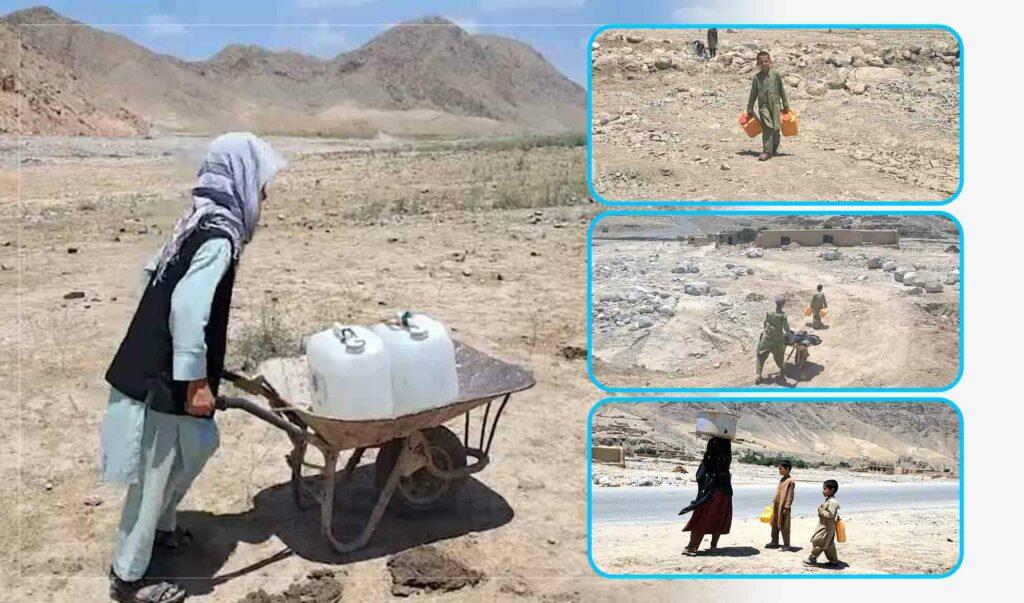PUL-I-KHUMRI (Pajhwok): Thousands of people in the Dahna Ghori, Dushi and Burka districts of northern Baghlan province have no access to drinking water and urged government to pay serious attention to their problems.
They complained have no access to drinking water and said they have to arrange drinking water from a long distance on animals.
There is water in some areas, but its sources are far away and water is wasted on the slopes of the mountains, however, if this water is managed properly, it would solve the drinking water problem of thousands of families.
Ahmad Khan, a resident of Dahna Ghori district, said the residents of Shalkato, Larkhab, Charmao and Dashtak areas accounted for around 5,000 families have no access to drinking water.
He said: “Residents of most areas of Dhanaghori district are far from drinking water. They fetch water from a well and a cistern, three kilometers away from Chashma Jangan, near the district market.”
Ziauddin, a resident of Azizabad village, who worked as cook in the district bazaar, said after morning prayer and in the evening he walked for 30 minutes to get drinking water and
He said: “We, about 70 families from Azizababa village, have been facing water shortage for many years, the drinking water streams are far away. After half an hour of walking, we reach the drinking water stream.”
Abdul Aziz Akhundzada, administrative head of the Dahna Ghori district villages, said they have 65 village councils in which the residents of only 17 village councils have access to drinking water.
He said: “There is a village called Bibi Guwari where people use donkeys to fetch water from a spring three kilometers away. Last year, a person who was fetching water from the spring fell from a mountain and died. Similarly, people in Shalkato, Larkhabi and other surrounding areas, which number thousands of families, are far from drinking water. Even in villages near the district market, people do not have enough water.”
According to his information, there is running water in a valley behind the above mentioned villages, but it is wasted in the sand, if managed properly, it could easily reach the district market through pipes, which will solve the drinking water problem of thousands of families.
Quadratullah, another resident of a remote area in Burka district, said the residents of Tangi Mrach and Shulqaq have no access to drinking water.
Residents of the villages of Shulqlaq and Tangi Mrach, which number about 500 families, save winter snow for drinking water, cover the roofs of their houses and wells with plastic to stop the water, then use it for drinking. There is no other option. Digging wells is impossible. There are springs far away, but the water is salty.
Abdul Sabir, a resident of Dahn Larkhab area, also did not have access to clean drinking water, and complained since the floods hit the region about six months ago, many families have been deprived of drinking water.
He said: “After this year’s floods in the Larkhab Valley, which destroyed its water sources, access to drinking water has been limited, I live in a rented house in the lower area, and fetch water from the madrasa below, dozens of families in the villages of Yakhtut and Babarano in the Larkhab Valley also bring water from remote places.”
But Noor Jan Kakar, spokesperson for the Department of Rural Rehabilitation and Development, said that drinking water and deep wells projects have been implemented in different areas of the province and some more projects would be implemented to address the drinking water shortage issue.
He said: “The Baghlan Rural Rehabilitation and Development Department has implemented 22 solar-powered drinking water networks and 47 semi-deep well projects in different areas of the province, work on 30 semi-deep wells is underway, Surveys have been conducted in areas where people need drinking water supply, and work will also be done on them”.
He did not talk about the drinking water issues of Dahna Ghori, Burka and Dushi districts.
Baghlan is considered the second most fertile province in the north of the country after Kunduz, after irrigating its fertile land, the snowmelt from the northern Salang reaches the agricultural lands of Kunduz.
However, residents of some mountainous areas in Baghlan were still deprived of the blessing of clean drinking water.
nh







GET IN TOUCH
NEWSLETTER
SUGGEST A STORY
PAJHWOK MOBILE APP